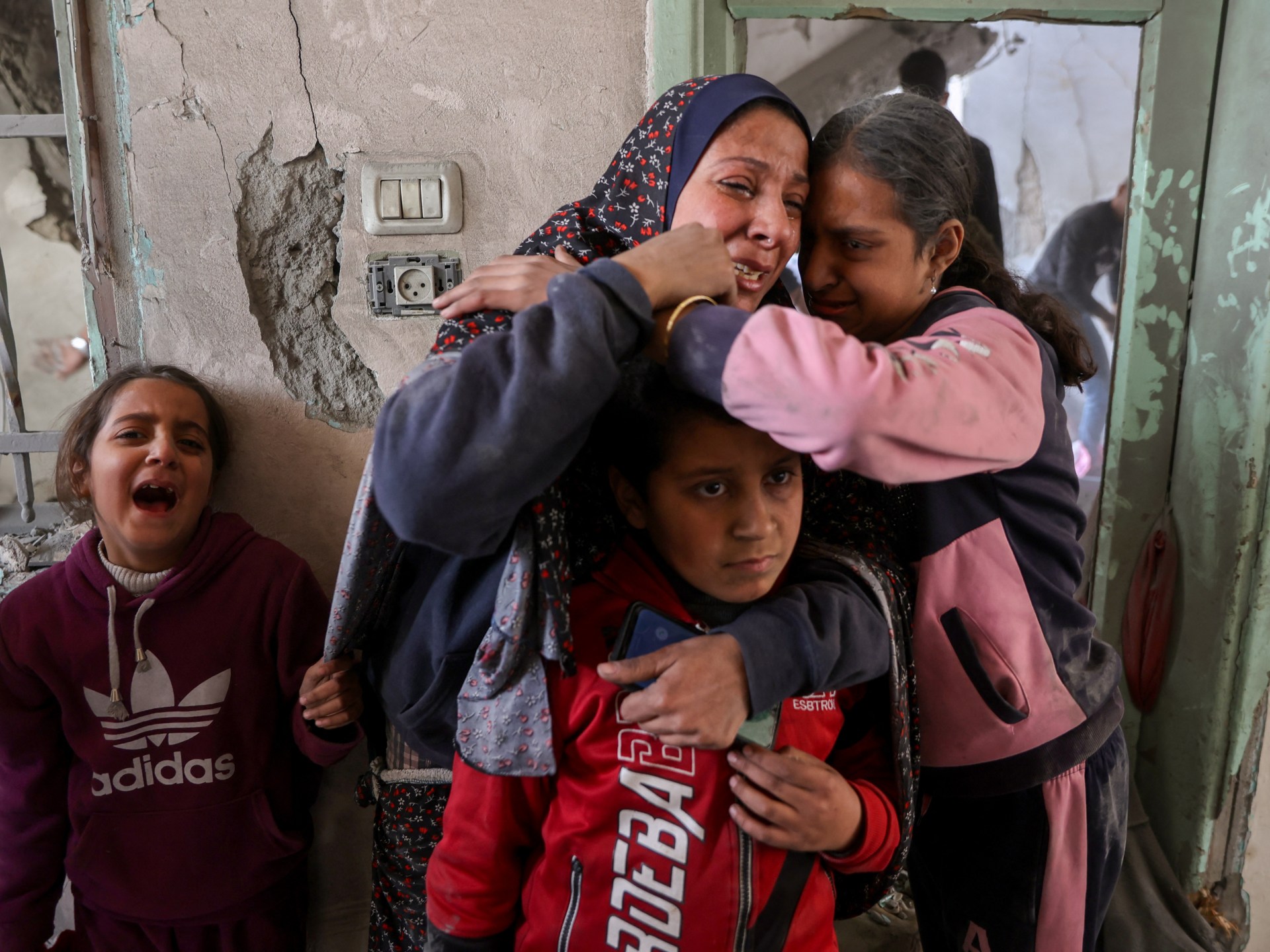The occupation forces stormed Kamal Adwan Hospital in the northern Gaza Strip, storming and burning it, forcing everyone inside to evacuate the hospital and detaining dozens of medical staff, including its director, Dr. Hossam Abu Safiya.
The sick and wounded have no other medical facility to go to, because Israel has destroyed all other hospitals in the north, and they cannot leave the north.
Northern Gaza has been under a “siege within a siege” imposed by Israel since October of this year, leaving tens of thousands of people there trapped without food, services or proper shelter, and now no hospitals.
Israel besieged Gaza in October 2023 and launched a war on its besieged residents, killing 45,399 people and wounding more than 107,000 so far.
Most of these people are civilians. Tens of thousands of children have lost at least one limb in Israeli bombing, and tens of thousands have become orphans.
All the while, Israel attacked hospitals and schools where people whose homes were bombed were sheltering.
Most of the internal opposition to the continuation of the Israeli war on Gaza centers around demands for the release of nearly 100 prisoners captured from Israel in a Hamas-led operation in October 2023.
However, awareness among many Israelis of the extent of their country’s actions in Gaza appears minimal.
The result, analysts say, is a pliant media that – with some notable exceptions – appears willing to emulate the country’s Prime Minister Benjamin Netanyahu and his increasingly far-right government.
At war with reality
In February, reports emerged that Netanyahu was trying to shut down public broadcaster Kan because it was resisting political pressure to change its editorial line.
Three months later, the Israeli government passed a draft law prohibiting Al Jazeera from operating within its territory.
In November, it passed a bill cutting ties with the liberal Israeli newspaper Haaretz, which has proven to be a consistent critic of the Netanyahu government and its war on Gaza.
In December, the Committee to Protect Journalists said that Israel had arrested 75 journalists in its territory, the occupied West Bank, and Gaza since the start of its war on Gaza, while others were subjected to assault, threats, and censorship.
Israel also killed nearly 200 journalists and media workers.
“Israelis have a right to know what is being done in their name, not least in the war in Gaza,” Rebecca Vincent, campaigns director at Reporters Without Borders, told Al Jazeera.
She added: “The Netanyahu government is deliberately working not only to portray a distorted narrative about the war in Gaza, but also to tighten state control over the media… This will have devastating long-term consequences for press freedom in Israel, but also for Israeli democracy.” .
Many humanitarian and human rights organizations working in Israel to advocate for Palestinian rights feel that their voices are being silenced amid growing hostility to their mission.
“There is no room for us to work,” says Dr. Jay Shalev, executive director of Physicians for Human Rights – Israel (PHRI), which campaigns for Palestinians’ right to health care.
He said: “There is only one platform available to PHRI and that is Haaretz… the only platform that presents news about the Palestinians, the occupation and Gaza and that is not guided by the security services.”
“There are others (outside the country), but they are small, and if you want to talk to Israelis in Hebrew, they may not exist either,” he said, referring to the information vacuum in which many operate in Israel.
Framing genocide
For Shalev, the issue is primarily one of framing, with news stories promoting the government’s war aims, rather than presenting facts.
Israel bombed Yemen on Thursday, striking the international airport in Sanaa where the head of the World Health Organization, Tedros Adhanom Ghebreyesus, was about to board a departing flight.
International media spoke about the danger to Ghebreyesus, who posted on social media that a member of the plane’s crew was injured and two people were killed at the airport.
Our job is to negotiate a release @United Nations Detained personnel and assessment of the health and humanitarian situation in #Yemen Wrap up today. We continue to demand the immediate release of the detainees.
As we were about to board our plane coming from Sanaa, about two hours ago, the airport arrived… pic.twitter.com/riZayWHkvf
– Tedros Adhanom Ghebreyesus (@DrTedros) December 26, 2024
In contrast, Israel’s most widely read newspaper, the free newspaper Israel Hayom, bragged about a strike during a “rebel press conference” and made no mention of the international diplomat’s killing.
Likewise, Yedioth Ahronoth, the second most widely read newspaper in Israel, praised the details of the attack, without mentioning the condemnation, including by the United Nations.
Shalev said that when issues such as the almost complete lack of humanitarian aid entering Gaza are mentioned, “the focus will be on Hamas, or the armed gangs, that are stealing it.”
He said this allows an Israeli narrative to grow that there is no famine in Gaza, and that even if there was, “Hamas is responsible for the famine, not Israel.”
Isolation in the echo chamber
“The public is mostly unaware of what happened in Gaza last year,” Haaretz columnist and former Israeli ambassador Alon Pinkas told Al Jazeera via WhatsApp.
“A lot of it is deliberate denial. It was understandable in the immediate aftermath of October 7, 2023, when people were devastated and wanted revenge.
However, Pinkas continued: “This is now unforgivable. The information exists, whether in Haaretz, or in the foreign media that covers it extensively, or in the US administration, or in various humanitarian agencies. People consciously choose to ignore.”
According to Shalev, the result of the information vacuum is increasing paranoia in a society that has been told to see itself under siege by the international community, its courts, institutions and human rights organizations because of a war – according to many of its audiences. Media – “legitimate”.
Referring to the two far-right ministers often credited as examples of Israel’s growing hard-liners, Shalev continued: “It’s more widespread than just (National Security Minister Itamar) Ben Gvir or (Finance Minister Bezalel) Smotrich.
“It’s a much broader sense of Jewish superiority. People take that for granted. It goes beyond the right wing or the left wing or the settlers. It’s everyone,” he said.
Shalev continued that the Israeli media’s presentation of war on Gaza is “only for the 30 to 50 percent of the population who need it. The others have already made up their minds. They don’t want to see any aid going into Gaza, they want to see hospitals attacked.”
He continued, “Growing up as an Israeli Jew, all of my education was about the Holocaust and how people at the time said they didn’t know about it, I could never understand it.”
“Now we see it happening again in a horrific way and we are all watching.”




